Goods Volume Doubles On Rly Cargo DFC
Logistics Revolution: Net tonne kilometres (NTKMs), a measure of freight volume, surged by 292.4mn NTKMs to 62,282 mn NTKMs during Apr-Oct 2024
Goods Volume Doubles On Rly Cargo DFC

New Delhi: The volume of goods movement on the new dedicated freight corridors (DFCs) of Indian Railways has doubled in the current financial year compared to 2023-24 marking a quantum leap in the country’s logistics landscape.
According to data compiled by the Dedicated Freight Corridor Corporation of India Ltd (DFCCIL), the net tonne kilometres (NTKMs) - a measure of freight volume - surged to 62,282 million between April and October 2024, increasing by a robust 292.4 million NTKMs per day from 32,164 million NTKMs or 151 million NTKMs per day during the same period in 2023.
The operationalisation of an additional 522 kilometres of the DFC network in 2023-24, has been a key driver of this growth.A senior DFCCIL official said that another 20 per cent jump in freight traffic was expected after the remaining 102 km stretch on the western DFC is completed by the end of 2025.
The traffic earnings for 2024-25 are also expected to shoot past previous records by a huge margin, he added.The official said that there’s a steady shift of freight traffic from the traditional railway routes to DFC. As many as 350 trains per day are already being run across the new network and this will be ramped up further as the corridors are designed to run an average of 480 trains per day.
"Our mandate was to take over 70 per cent of the railways’ traffic on the sections running parallel to eastern DFC and western DFC. In eastern DFC, which has been fully commissioned, we have already crossed 80 per cent while on western DFC, the figure stands at around 60 per cent," he said.
The shift of goods traffic to the DFC has also helped to decongest traffic on the conventional Delhi-Mumbai as well as Delhi-Kolkata routes, enabling the railways to enhance efficiency.
The 1,506-km western DFC mainly carries containerised cargo, cement, petroleum products, and trucks-on-train, while the eastern corridor’s 1,337-km segment caters to the movement of heavy bulk cargo such as coal, iron, steel, fertilisers, foodgrains, and containers.

